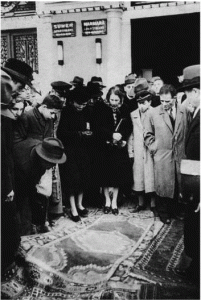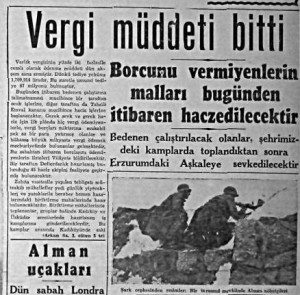




 |
 |
 |
 |
 |
VIP Forums Muzblog Chat Games Gallery. Ôîðóì, ìóçäíåâíèêè, ÷àò, èãðû, ãàëëåðåÿ. |
||||
|
||||||||
| Diaspora News and events in Armenian and other diasporas. |
 |
‘I’ll squeeze those Armenians like lemons’ |
LinkBack | Thread Tools | Display Modes |
|
|
#1 (permalink) |
|
Top VIP VIP Ultra Club
Join Date: Jan 1970
Posts: 12,055
Rep Power: 69
 |
Special for the Armenian Weekly
It was one of those receptions that had taken months to organize. The tables were fitted with fancy decor topped with bouquets of tulips picked from all parts of the country. The hall was unlike most other halls in the city; elaborately embellished with handmade ornaments, it had the capacity to dazzle one’s eye. Throughout the night, couples mingled, announcers made long speeches, and others danced. It was the place to be. The reception took place in Istanbul and was hosted and organized by a local Armenian church. The leading figures of Istanbul’s Armenian community were present. Among those invited were various government dignitaries, including Ismet Inonu, then president of the Republic of Turkey. Inonu was accompanied by his wife, who was impressed by the decorations and the preparation that went into the event. “My goodness, such beautiful decorations!” she said gleefully. “Where do they come up with the money to finance all this wonderful decor?” “Don’t ponder about that too much,” Inonu replied sternly. “Pretty soon, I’m going to squeeze them like lemons so hard that they’ll run dry.” Inonu would never back down from his promise. A few years after this event, in a village nestled deep in the heart of Anatolia, my grandfather, who was 14 at the time, was returning home after a day spent playing with neighbors. He found the front door left open and a blaring commotion inside his home. As he walked in, he saw his three older sisters sobbing, his mother on the divan crying uncontrollably, and his father sitting beside the table with a folded piece of paper on his lap. Asking what had transpired, his father replied, “This year’s taxes came in,” as he waved the bill in his hand. “There’s no possible way I can pay it. It’s three times what they were last year. The only way to keep our home and livelihood is if I go to Askale.” What terrified the family the most wasn’t the tax bill itself, but the prospect of their father and husband having to go to Askale and serve in the harrowing labor camps there.  In the days of Varlik Vergisi of 1942, when non-Muslims were forced to sell their possessions to pay the exuberant taxes imposed on them In the days of Varlik Vergisi of 1942, when non-Muslims were forced to sell their possessions to pay the exuberant taxes imposed on themThese were the days of the Varlik Vergisi of 1942, a tax policy that was supposed to be levied on the wealthiest citizens of Turkey. However, it was the Armenians who paid the biggest burden with a tax hike of 232 percent—the most punitive tax rates to be known in Turkey. Although the heaviest hit were the Armenians, the Jews, Greeks, and converts (Donmehs in Turkish) were hit hard as well. The policy’s main proponents were two men—President Inonu and Prime Minister Sukru Saracoglu—who championed the idea of taxing the non-Muslim minorities heavily before Turkey’s potential involvement in World War II. These men are much revered in Turkish society today. In fact, two of the largest stadiums in Turkey are named after them. For the Armenians, however, it was part of another genocide in the making. If Stalingrad was to fall, and Germany subsequently named victor of the war, Turkey was to wipe out its minorities—the same way its tentative ally Nazi Germany had done in Europe. Turkey knew that an ally like Germany would never condemn it; on the contrary, Germany would encourage it. Moreover, with an alliance with Germany and the fall of the USSR, the nationalist clique within the Turkish government was excited about the prospects of an open corridor into Central Asia. In this sense, the Turkish government found an opportunity to complete what it had left unfinished in the previous war. The government’s master plan was thereby programmed similarly to how the Young Turks set up their genocidal policy prior to World War I: heavy taxation; labor battalions of able-bodied men; the militarization of society; the forceful conscription of Armenians into the army in what became known as the Twenty Classes, or the Yirmi Kura Ihtiyatlar Olayi; and the eventual reunification with their brethren in Central Asia by demolishing anyone in their way. By this time, it was reported that 26 armed Turkish divisions were stationed across the border with Armenia, waiting for an opportunity to launch an offensive. As such, another Sardarabad was to commence if Germany succeeded in Stalingrad. In other words, my worried great grandmother had every right to believe that history was to repeat itself. Upon hearing of his father’s decision to go to Askale, my grandfather rushed out of the house in tears. He sat on the curb in front of his home and unleashed a frantic wail. A Turkish man, who just so happened to work in the local tax bureau, saw my grandfather crying and approached him. The man asked my grandfather why he was crying; my grandfather said that his father was going to Askale and that he may never see him again. The man already knew about the taxes, but had little power to circumvent the damage. Deeply moved by my grandfather’s grief, he nevertheless demanded the tax forms from my grandfather and said he would try to help. Miraculously, the man managed to render the tax bill void and thus saved the life of not only my great grandfather, but his home and the entire family from certain doom. To this day, my grandfather believes that man was an angel sent from God. It was through such confiscations that the Turkish government reportedly collected 314,900,000 liras (or about $270 million) that amounted to 80 percent of the state budget. Just like in the previous war, Turkey now had the money it needed to fund its war machine at the expense of non-Muslims—mainly Armenians—in the wake of another world war.  A newspaper headline announcing, ‘The Tax Period Has Ended,’ but adding, ‘If these taxes aren’t paid, their belongings will be confiscated.’ A newspaper headline announcing, ‘The Tax Period Has Ended,’ but adding, ‘If these taxes aren’t paid, their belongings will be confiscated.’It may be a lesser known part of Armenian and Turkish relations, but these events were so profound that they still have an effect on my family and I today. I wonder what would have happened to my family if that man had never encountered my grandfather on the curb crying. I also wonder what would have happened if the tides of war had swung in Germany’s favor. One can’t help but assume that my family would not have come out of the war alive if Germany had won the war. With an entire people squeezed dry from the “lemons” they once were, I don’t believe such questions matter. But with non-Muslims essentially reduced to a few thousand in Turkey today, one can’t help but wonder who the Turkish government will tax next in case of a third world war? The post ‘I’ll squeeze those Armenians like lemons’ appeared first on Armenian Weekly. Special for the Armenian Weekly It was one of those receptions that had taken months to organize. The tables were fitted with fancy decor topped with bouquets of tulips picked from all parts of the country. The hall was unlike most other halls in the city; elaborately embellished with handmade ornaments, it had the capacity to dazzle one’s eye. Throughout the night, couples mingled, announcers made long speeches, and others danced. It was the place to be. The reception took place in Istanbul and was hosted and organized by a local Armenian church. The leading figures of Istanbul’s Armenian community were present. Among those invited were various government dignitaries, including Ismet Inonu, then president of the Republic of Turkey. Inonu was accompanied by his wife, who was impressed by the decorations and the preparation that went into the event. “My goodness, such beautiful decorations!” she said gleefully. “Where do they come up with the money to finance all this wonderful decor?” “Don’t ponder about that too much,” Inonu replied sternly. “Pretty soon, I’m going to squeeze them like lemons so hard that they’ll run dry.” Inonu would never back down from his promise. A few years after this event, in [...] The post ‘I’ll squeeze those Armenians like lemons’ appeared first on Armenian Weekly. Special for the Armenian Weekly It was one of those receptions that had taken months to organize. The tables were fitted with fancy decor topped with bouquets of tulips picked from all parts of the country. The hall was unlike most other halls in the city; elaborately embellished with handmade ornaments, it had the capacity to dazzle one’s eye. Throughout the night, couples mingled, announcers made long speeches, and others danced. It was the place to be. The reception took place in Istanbul and was hosted and organized by a local Armenian church. The leading figures of Istanbul’s Armenian community were present. Among those invited were various government dignitaries, including Ismet Inonu, then president of the Republic of Turkey. Inonu was accompanied by his wife, who was impressed by the decorations and the preparation that went into the event. “My goodness, such beautiful decorations!” she said gleefully. “Where do they come up with the money to finance all this wonderful decor?” “Don’t ponder about that too much,” Inonu replied sternly. “Pretty soon, I’m going to squeeze them like lemons so hard that they’ll run dry.” Inonu would never back down from his promise. A few years after this event, in [...] The post ‘I’ll squeeze those Armenians like lemons’ appeared first on Armenian Weekly. [img][/img] More... |
|
|

|
|